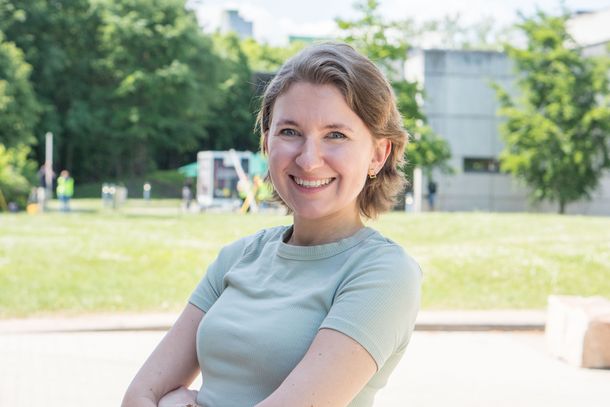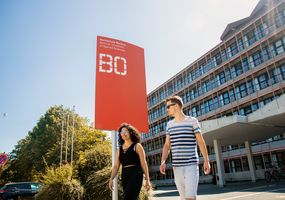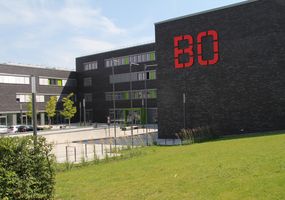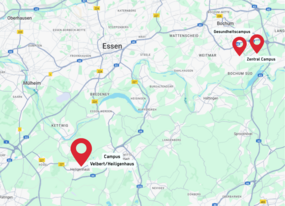Guide for International Applicants
You are from abroad and interested in studying at Bochum University of Applied Sciences? Then you've come to the right place! The International Office will guide you through the process of studying here—from choosing a degree program to applying and enrolling. You will find all the information you need here.
Before Application
Study programs
The University of Applied Sciences Bochum offers more than 80 bachelor's and master's degree programs. The Central Student Advisory Service (ZSB) helps prospective students find the right degree program. Familiarize yourself with our degree programs and admission requirements.
Winter Semester Application Deadline: June 15, 2026.
Application
Please upload all documents in both the original language and in German or English translation (this also applies to grade transcripts).
Accepted translations:
- By sworn or court-approved translators
By an authorized department of the issuing school or university
Not accepted: Translations by non-sworn translation agencies!
a) Apply directly via the Bochum University of Applied Sciences portal if you:
- are a German or EU/EEA citizen
- have a spouse or parent who is a German or EU citizen and works in Germany
- are a citizen of Iceland, Liechtenstein, or Norway
b) Apply via uni-assist if you:
- are not an EU/EEA citizen and
- You obtained your university entrance qualification abroad
(even if you have taken the assessment test at a preparatory college – this is only sufficient in conjunction with your home country certificate)
- Curriculum vitae
- Copy of your national passport (with photo and personal details)
- Proof of your language skills or confirmation of registration for a language test
(the result must be available at the latest within one month after application)
For bachelor's degree programs:
- Certificates qualifying you to admission to the degree program (including a list of subjects and grades)
➤ Please also check the country-specific information on the uni-assist website! - Internship certificate (if required for the chosen degree program)
For master's programs:
- Your degree certificate and a transcript of your grades. No parts of your transcript may be missing.
- In order to calculate your grade, uni-assist requires the grading system used by your university for your degree program.
- Letter of motivation (for master's programs in architecture)
Proof of professional experience (for the master's program in Management for Engineering and Natural Sciences - Consortium)
Note: Please check in advance whether your final grade meets the admission requirements.
➤ Conversion of your grade using the modified Bavarian formula.
Please also refer to the uni-assist checklists: Applying in 6 steps.
Not all foreign school qualifications are automatically recognized in Germany. Some applicants must first attend a preparatory college (Studienkolleg) and take an assessment test (Feststellprüfung).
At Bochum University of Applied Sciences, there is an alternative:
You can take the TestAS. With a good result, you will receive a subject-specific university entrance qualification. This will allow you to begin a bachelor's degree program in a suitable field at Bochum University of Applied Sciences.
The test has two parts:
- a core test
- a subject test (appropriate to the degree program, e.g., technology, economics, etc.)
- Your average score must be at least 24 percent rank points (from both parts).
- You must also submit your school certificates from your home country.
- If you already have a recognized university entrance qualification (general or subject-specific), you do not need to take the TestAS.
- Some degree programs may have higher requirements.
Contact
Central Campus
Health Campus
Lena-Marie Bolsinger
Mail: Bewerbung-GC(at)
Tel: +49 234 36186 9501
After Admission
After a successful application, you will receive an acceptance letter and further information concerning the enrolment process and necessary documents.
For the enrollment you will find your personal deadline in your letter of admission. You will have to enrol before the deadline in order to keep your admission.
Students from non-EU/EEA countries (third countries)
If you want to study in Germany, you will in many cases need a visa—even if you already have a residence permit from another EU country. Whether you need a visa depends on your nationality. You can find a current list of countries requiring a visa on the website of the Federal Foreign Office.
Please contact the German embassy or consulate in your home country as early as possible to find out which entry requirements apply to you and which documents you need for your visa application.
Important: You must apply for your visa in your home country before entering Germany. Entering Germany with the wrong visa may result in you not being allowed to start your studies.
Attention: Citizens of Australia, Canada, Israel, Japan, New Zealand, Republic of Korea and USA do not need a visa to enter Germany. If you stay longer than 90 days, you need to apply for a residence permit in Germany
Students from EU member states, the European Economic Area and Switzerland
You don’t need a visa to enter Germany and study here. You have to register with the residents’ registration office. If you stay longer than 90 days, you need to apply for a residence permit in Germany.
You cannot study on a tourist visa!
- A tourist visa does not entitle you to study in Germany.
- It cannot be converted into a student visa or residence permit at a later date.
After entering the country
Once you have arrived in Germany, you must convert your visa into a residence permit for the purpose of studying. The immigration office in your place of residence is responsible for this. Make an appointment as early as possible, as there may be long waiting times depending on the city.
Step by Step to Germany- with the VisaFlow app!
The VisaFlow web is a service designed to assist our international students with all the bureaucratic steps involved in the application for the German Student Visa and Residence Permit. In addition, the Info Hub on the VisaFlow platform offers information and useful tips for important topics such as Housing, Health Insurance, Student Life in Germany, Working as a Student etc.
You can use the app free of charge with the access code HSBOCHUM25.
Before coming to Germany, you will need to provide proof of financial support. This serves as assurance that you have enough money to study in Germany and amounts to approximately €11,200 for one year. Ways to provide proof include:
- Proof of your parents' income
- A security deposit in a blocked account (Sperrkonto)
- A bank guarantee
- A recognized scholarship (further information is available from the DAAD).
Health insurance is mandatory for all students in Germany. Without proof of insurance, you cannot enroll at Bochum University of Applied Sciences!
- Check early on whether your health insurance from your home country is also valid in Germany.
➤ This applies in particular to students from the EU: With the European Health Insurance Card (EHIC), you are often already covered. - If your own health insurance is not valid in Germany, you should take out insurance (public or private) at the latest after your arrival in Bochum.
By the time you enroll, we will need the following from you:
- Electronic notification from your health insurance company (M10 notification)
- Please provide your health insurance company with our sender number H0000683.
- It is best to contact your insurance company as early as possible so that everything arrives on time.
After Enrollment
Have you successfully enrolled and arrived in Bochum? Bochum University of Applied Sciences offers a wide range of advisory and support services to make your start at the university and in Germany as easy as possible.
Special Topics
This page conveys the information shared here by the DAAD.
Preliminary note:
The following information refers to students who were granted a residence permit under paragraph 16 of the German Residence Act (§16 Aufenthaltsgesetz). Students with a permanent residency permit do not require a special working permit.
It also does not apply to most EU citizens and nationals of the EEA states and Switzerland. EEA states and Switzerland. It only applies to Bulgarian, Romanian, and Turkish students to a limited extent.
Legal basis:
International students with a residency permit under §16 of the Residence Act are allowed to work up to 240 half days or 120 full days in a year. This restriction generally applies regardless of the contract type (Minijob, Midijob, Internship, etc.).
Exception: so-called Studentische Nebentätigkeiten, that is, student part-time jobs that are based at the university or in the vicinity of the university (e.g., research assistant, jobs at the student union or AStA). In those cases, the restriction (240 half-days/ 120 full days) does not apply.
Anyone who wants to work more than 120 full or 240 half days in a job that is not a student part-time job, must obtain authorisation from the immigration foreigners’ authority.
Possible combinations:
Most students would like to work full-time during the semester break, and less during the semester. Combining full and half days is a possibility.
For example, if you want to work 22 full days in each of the two semester breaks, you still have 76 full days which can be divided into 152 half days through the semester.
Authorisation of longer/more frequent work by the immigration authority:
If you need to work more than 240 half days/ 120 full days and cannot do so in a part-time student job, you can ask to the Foreigners' Registration Office for permission.
This requires a concrete job offer with details of the duration and location of the working hours and salary/wage required. The foreigners’ authority will ask the employment agency for approval, which in turn will check whether there are suitable "preferential" unemployed persons available for the job, and whether the income meets the usual standards.
Even if the employment agency agrees, the immigration authority can refuse permission if they conclude that the work would jeopardize the success of your studies.
*Working more than you’re allowed to can lead to the immigration’s office decision to not extend your residency permit.
Self-employment:
If you would prefer to finance your studies through self-employment (e.g. as a translator, software developer, self-employed cleaner, music or language teacher, etc), it is also possible under residence law (§ 21 (6) Residence Act). However, the foreigners’ office must authorise the self-employment separately.
The condition is that the scope of the work may not jeopardise the success of your studies. It should therefore remain within the time limits of the rules for dependent employment. Anyone who wants to start a full-time business will not receive authorisation.
In addition to a permit from the foreigners’ authority, in some cases a licence to carry out the activity is necessary, in others a business registration. For freelancers, a tax number from the tax office is sufficient.
Where to find a job as a student:
If you are looking for a job and cannot find one through newspaper/internet adverts or personal contacts, check Catapult, our job portal.
If you are interested in working as a student assistant at our university, the Central Student Counselling Service constantly shares job postings for open spots on their Instagram profile (@zsb_hsbochum).
If you are interested in attending a preparatory (german) language course or need a visa while going through the application process in Germany, this information could be helpful.
- Visa to attend preparatory language courses (§ 16 Para. 1 AufenthG): Permitted for foreigners who wish to study at state or state-recognised universities. German language skills are proven by the DSH examination. The residence permit is issued for participation in a time-limited intensive language course, which can take place at universities or comparable institutions. As a rule, the preparatory study programmes may not exceed a total of 2 years.
As an international student at our university you may take part in our preparatory german course. You can find more information here.
- Visa for university applicants (§ 16 Para. 1a AufenthG): Authorised for foreigners who are staying in Germany for the purpose of applying to university. The maximum length of stay as a student applicant is nine months. Within this period, proof of admission to a degree programme or admission to a preparatory language course or preparatory college must be provided.
A Studienkolleg is an institution that prepares students, academically and linguistically, for their studies in Germany during a one-year course.
Visa to attend a preparatory college (Studienkolleg) (§ 16 Para. 1 AufenthG): Authorised for foreigners who wish to obtain the qualification for admission to university by attending a preparatory college followed by an assessment test. The Düsseldorf district government is responsible for applications for admission to a preparatory college in North Rhine-Westphalia. As a rule, the preparatory study programmes (language course and/or preparatory college) may not exceed a total of 2 years.
If you are interested in a Studienkolleg and have already been accepted for the entrance test, here are the basic steps for your residence permit. Detailed information can be obtained from the respective Studienkolleg (i.e. Studienkolleg Bochum: Preparatory College | Studienkolleg Bochum (studienkolleg-bochum.de).
1. Apply for a visa for study application:
- Once you have been accepted for the entrance test, you can apply for a visa to apply for a degree programme.
- The residence permit can last up to 9 months in accordance with § 17 Para. 2 AufenthG.
2. Convince the embassy:
- Show good school grades, a CV with no gaps and certified language skills (at least B1, better B2).
- Present a clear motivation to study and indicate a contact person in Germany who will support you.
- Ideally, you should be under 25 years of age and have relevant work experience or training related to the intended degree programme.
3. Master the entrance exam:
- The entrance exam consists of a language test (B1 recommended) and a subject test.
- Pass both parts in order to pass the preparatory course.
4. From the preparatory college to the degree programme:
- After successfully completing the Studienkolleg, you can take the assessment test, which is required for entry into a regular degree programme.
For more detailed information, please contact the Studienkolleg directly (as stated earlier). We look forward to welcoming you to Bochum University of Applied Sciences! If you have any further questions, please do not hesitate to contact us.
Contact
International Office

Kerstin Barton
Mail: welcome(at)
Tel: +49234 36186 9704





